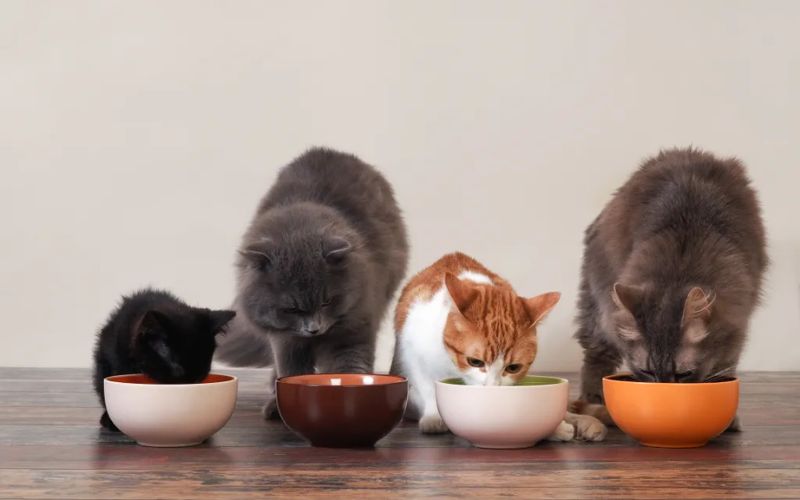If you’ve just gotten a kitten or adopted a cat, you may be curious about what kind of food they need. Kittens consuming adult cat chow is a topic of frequent inquiry. Kittens have different nutritional demands than adult cats, so knowing what those are can help you provide for them in a way that will promote healthy growth and development.
The Key Differences in Nutritional Needs
Kittens and adult cats have different nutritional needs because they are at different life stages. The main distinctions are as follows:
Protein Content:
The importance of protein in a cat’s diet cannot be overstated. It’s vital for a number of reasons, including tissue growth and repair, immune system functioning, and general health. The protein needs of kittens are much greater than those of fully grown cats. This is due to their quick expansion and improvement. In order to construct muscles, organs, and other tissues, their bodies require a greater quantity of amino acids. Protein levels in adult cat food are often lower than in kitten food, which may not be sufficient for a growing kitten.
Energy and Calorie Intake:
Kittens have an endless supply of energy and are extremely lively. They are quite active, running, jumping, and even playing rough with one another. Kittens need a higher calorie diet than adult cats to keep up with their high activity levels and develop normally. Consuming adult cat food, which typically has less calories, might cause energy deficiencies in developing kittens.
Vital Vitamins and Minerals:
Certain nutrients are essential for a kitten’s development but may be lacking in adult cat chow. DHA, a type of omega-3 fatty acid, is one example of this type of nutrition. Kittens need DHA for proper brain growth and eye development. Kitten formulations often contain extra DHA to help with development and learning.
Ratios of Calcium and Phosphorus:
Kittens need a healthy dose of both calcium and phosphorus to grow strong bones. These minerals are essential for healthy bone development and tooth enamel formation. Kittens have a different optimum calcium-phosphorus ratio than adult cats. Skeletal issues including low bone density or abnormalities might develop if kittens are fed adult cat chow, which may not have the proper ratio.
When Can Kittens Transition to Adult Cat Food?
Depending on their breed and rate of growth, most kittens begin eating adult cat food at between 9 and 12 months of age. It is during this stage of change that most kittens reach their full adult size and weight. Some cats may continue developing until 18 months or longer, so it’s important to get your vet’s advice on whether to switch to adult cat food.
How to Choose the Right Kitten Food
To satisfy their specific nutritional needs, kittens have specific food preferences. Take into account the following:
Check the Label for the Word “Kitten”
Choose a brand of cat food that advertises itself as a “kitten” or “growth” formula. Kittens have unique dietary requirements, and these formulations aim to satisfy those.
Check the AAFCO Statement
Choose a kitten food that has been certified as having adequate levels of nutrients for development and reproduction by the Association of American Feed Control Officials (AAFCO).
Get in Touch with Your Vet
Your cat’s food should be adjusted according to your vet’s recommendations. Your kitty’s age, breed, level of activity, and dietary needs can all be taken into account.
How to Transition to Adult Cat Food
It’s important to gently switch your kitten over to adult cat chow to prevent any tummy troubles. Just do what I say:
Mixing in the new adult cat food with your kitten’s current food should be done gradually over the period of roughly a week. The kitten food should be gradually reduced as the new food is increased in quantity.
Keep a watch on your kitten’s growth, activity level, and general well-being as it makes the adjustment. Changes in appetite, diarrhea, or weight loss are all signs that veterinary attention is needed.
Because the change may impact your kitten’s thirst, you should provide constant access to clean water. Maintaining healthy levels of hydration is essential to good health.
Conclusion
In conclusion, your kitten’s health and well-being depend on you giving it the proper nutrients as it ages. A kitten’s nutritional requirements are somewhat different from an adult cat’s, including a higher protein consumption, higher caloric intake, certain important elements, and a balanced calcium-phosphorus ratio. To ensure a long and healthy life for your feline friend, it’s important to follow your vet’s advice when it comes to choosing the correct kitten food and making the switch to adult cat food.
